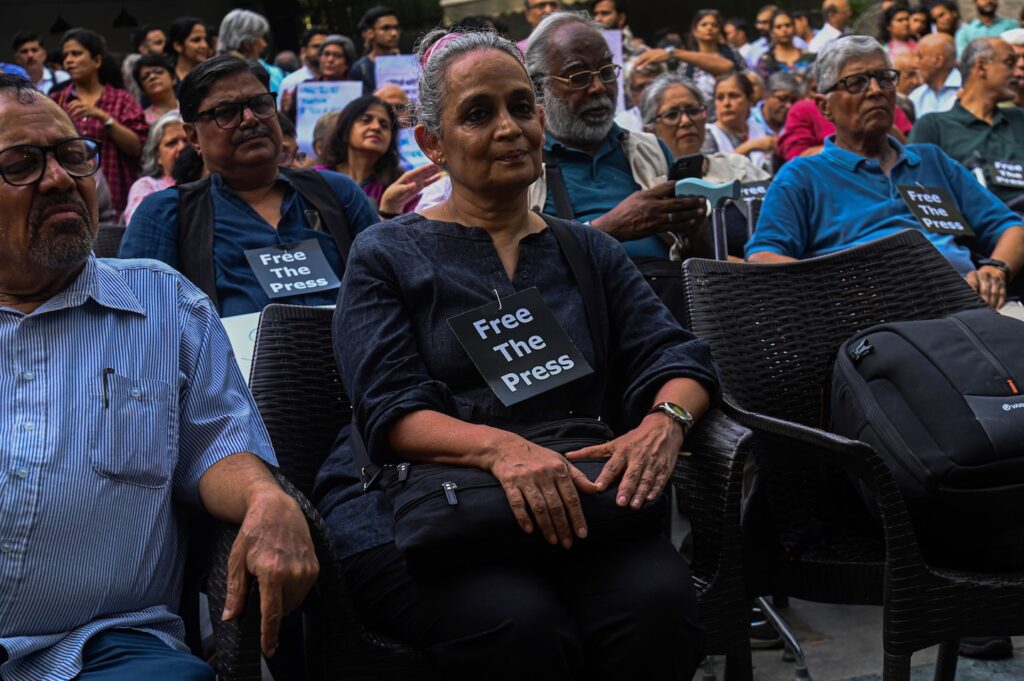Siddhartha Deb is the author of Prisoners of Twilight: The Rise of the Hindu Right and the Fall of India and the novel Light at the End of the World.
Why would a writer, even one who is world famous, oppose the political necessity of a sudden and looming authoritarian political movement?
Nearly 14 years ago, in 2010, Arundhati Roy, one of India's most prominent writers, spoke at a public conference in New Delhi. Her topic was the disputed territory of Kashmir and India's increasingly brutal measures (torture, extrajudicial executions, sexual assaults, imprisonment, deprivation of civil liberties) to suppress the restive residents of the country's only Muslim-majority state. Roy, along with four other activists, spoke candidly about India's abysmal record in Kashmir, particularly the killing of 118 Kashmiris by security forces during protests against the government that year.
Her comments were not a surprise to those who know Roy. The Booker Prize-winning author of “The God of Small Things” has long used her public profile to publicly criticize human rights violations in Kashmir and the policies of the Modi government. But a week after the event, a Kashmiri Hindu activist filed a complaint with Delhi Police against Roy and other speakers at the conference.
The charges are wide and varied, ranging from “challenging the territorial integrity of India” to “disturbing the public peace” and “promoting hostility between social groups”. Similar cases were simultaneously filed against Roy in Chandigarh and Bangalore, and radical Indian nationalist media turned up in front of her house and filmed stone-throwing mobs that turned up there.
No progress was made on the charges until last October, when Delhi's lieutenant governor, VK Saxena, revived them and ordered government agencies to proceed with the case. Saxena re-emerged on June 14, leaking a memo to the media declaring that his office had requested that Roy be charged under the Unlawful Activities Prevention Act, the strictest of India's anti-terrorism laws, a law so barbaric and twisted that it amounts to a kind of anti-law.
The clue is in the timing. In October, Prime Minister Narendra Modi and his right-wing Hindu nationalist Bharatiya Janata Party (BJP) were seeking re-election to a third term with an absolute majority of 400 seats. This month, they returned to power, but with just 240 seats, they had to rely on other parties to form a government. Despite the repression of political opponents, total control of the media, and conveniently broken voting machines, they lost more than 60 seats, leaving the Hindu right in disarray.
The sudden prosecution of Roy appears to be a blatant show of force by a weakened BJP and only indicates the fragile attempts of the party to cling to power.
In his two consecutive terms, Modi has transformed India into a violent majoritarian state while shoring up the remains of a broken economy. Under his leadership, the Hindu right has lynched people, assassinated the writer Gauri Lankesh, disenfranchised over a million Muslims in the northeastern state of Assam, stripped Kashmir of its nominal autonomy, introduced a Nuremberg-style citizenship law targeting Muslims, used the courts and police against activists and critics, and made them languish in filthy prisons for years because of obviously false evidence planted by government agencies. In the case of Stan Swami, an octogenarian Jesuit priest and activist who suffered from Parkinson's disease, the combination of false evidence and incarceration led to his death.
This toxic majoritarianism has worked great for the Prime Minister so far. But even in Ayodhya, where Modi inaugurated a gaudy temple of Hindu superiority earlier this year, the BJP candidate lost. Indian voters finally seem to realize that the BJP's achievements have been limited to increasing the wealth of a few oligarchs while job opportunities, food security, public health and public infrastructure are destroyed. India under Hindu rights seems, in some ways, more unequal than it was under British colonial rule.
The announcement targeting Roy is clearly intended to galvanise the faltering spirit of Hindu nationalism and bury any debate on Modi's missteps under a trumped-up narrative about anti-national writers.It is significant that neither Roy nor her lawyers have received any official documentation of the alleged charges and the smear campaign has been played out in full in the media.
These are old and proven tactics of the Hindu right, part of a long-standing anti-democratic history of targeting critics and journalists alike.
The message is simple: the bigwigs remain unfazed, everything is under control and the machine of hate continues to run. Why should writers and the electorate at large object to such bombastic claims? But if the past few weeks have taught us anything about India, it is that people are beginning to realise that majoritarian hatred does little to nourish starved bodies and frustrated minds.



